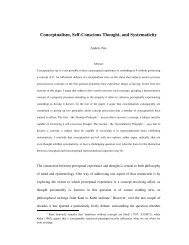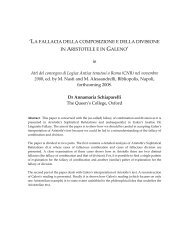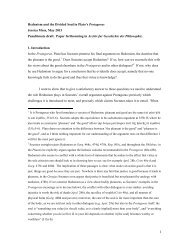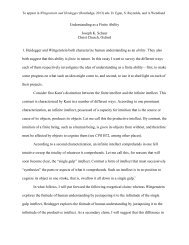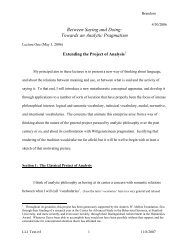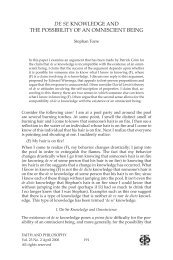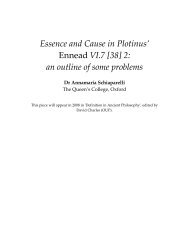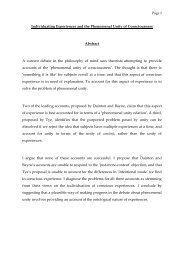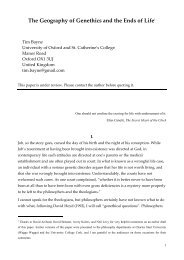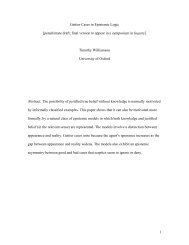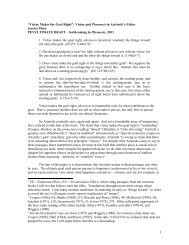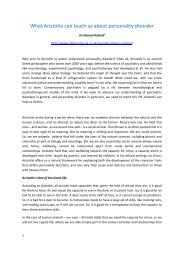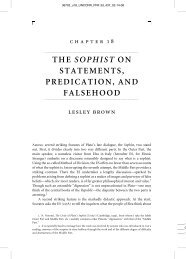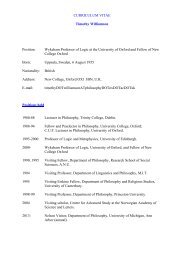Say who everyone is as you go along - Faculty of Philosophy ...
Say who everyone is as you go along - Faculty of Philosophy ...
Say who everyone is as you go along - Faculty of Philosophy ...
You also want an ePaper? Increase the reach of your titles
YUMPU automatically turns print PDFs into web optimized ePapers that Google loves.
48<br />
'anatman might be expressed in the form, "The true Self <strong>is</strong> non-Self," since any<br />
attempt to conceive the Self, believe in the Self, or seek for the Self immediately<br />
thrusts it away' (WZ 47)<br />
Two mutually incons<strong>is</strong>tent ide<strong>as</strong> need separating here. One <strong>is</strong>: there <strong>is</strong> no self, the<br />
other <strong>is</strong>: there <strong>is</strong> a self but it <strong>is</strong> systematically elusive. The claim that 'the true Self <strong>is</strong><br />
non-Self' <strong>is</strong> the thes<strong>is</strong> that there <strong>is</strong> no psychic subject <strong>of</strong> one's own experiences, no<br />
inner source <strong>of</strong> one's own thoughts and experiences. If we can still properly talk <strong>of</strong> a<br />
true self, it <strong>is</strong> those experiences, or perhaps the series <strong>of</strong> psycho-physical events that<br />
constitutes a life. Th<strong>is</strong> <strong>is</strong> an ontological doctrine, a doctrine about what does or does<br />
not ex<strong>is</strong>t. It <strong>is</strong> not compatible with the view that there <strong>is</strong> an inner psychological self<br />
which cannot itself be the object <strong>of</strong> thought and experience. On th<strong>is</strong> view, the self <strong>is</strong><br />
that which thinks and so cannot be thought. It <strong>is</strong> that which experiences, and so<br />
cannot be experienced. It <strong>is</strong> that which believes, so cannot be believed in. It <strong>is</strong> itself<br />
the seeker and so cannot be found. The subjective self <strong>is</strong>, so to speak, so subjective<br />
that it cannot ever be properly construed <strong>as</strong> objective.<br />
It might be thought that th<strong>is</strong> doctrine <strong>of</strong> the elusive nature <strong>of</strong> the self embodies<br />
a logical fallacy. From the fact that the self <strong>is</strong> that which thinks and experiences it<br />
would seem not to follow <strong>as</strong> a matter <strong>of</strong> logic that it cannot itself be thought or<br />
experienced. In a way that <strong>is</strong> right. The inference <strong>is</strong> invalid. However, the point <strong>is</strong><br />
that <strong>as</strong> object <strong>of</strong> thought the self <strong>is</strong> not the subject <strong>of</strong> thought and <strong>as</strong> object <strong>of</strong><br />
experience the self <strong>is</strong> not subject <strong>of</strong> experience. Thinking <strong>of</strong> something <strong>is</strong> necessarily<br />
thinking <strong>of</strong> it <strong>as</strong> an object <strong>of</strong> thought. Experiencing something <strong>is</strong> necessarily<br />
experiencing it <strong>as</strong> an object <strong>of</strong> experience. Th<strong>is</strong> does not preclude also thinking <strong>of</strong> it,<br />
or experiencing it <strong>as</strong> a subject, but it does at le<strong>as</strong>t present a psychological obstacle to<br />
doing that. To draw an analogy, in seeing something, the eye that sees does not see<br />
the eye that sees. Th<strong>is</strong> <strong>is</strong> not due only to contingent anatomical facts about the<br />
location <strong>of</strong> the eyeball in the human body. It <strong>is</strong> also due to the fact that eyeballs are<br />
subjective, they are part <strong>of</strong> the subjective standpoint <strong>of</strong> the seer. Th<strong>is</strong> <strong>who</strong>le doctrine<br />
<strong>is</strong> not only ontological it <strong>is</strong> also ep<strong>is</strong>temological. It <strong>is</strong> not only about what does or<br />
does not ex<strong>is</strong>t, it <strong>is</strong> also about what we can or cannot know. It implies we cannot<br />
know what we are, or, at le<strong>as</strong>t, we cannot know through ordinary methods <strong>of</strong><br />
thinking or experiencing what we are.<br />
It <strong>is</strong> the first <strong>of</strong> the two doctrines about the self that Watts needs. It <strong>is</strong> not part <strong>of</strong><br />
Buddh<strong>is</strong>m that there ex<strong>is</strong>ts an inner, systematically elusive self. It <strong>is</strong> the Buddh<strong>is</strong>t<br />
doctrine that there <strong>is</strong> no self. As Suzuki puts it:<br />
'Muga, wu-wo, anutman, 'non-e<strong>go</strong>', selflessness' [...] <strong>is</strong> the central concept <strong>of</strong><br />
Buddh<strong>is</strong>m, both Hinayana and Mahayana' (ZNM 120)<br />
Watts himself says



